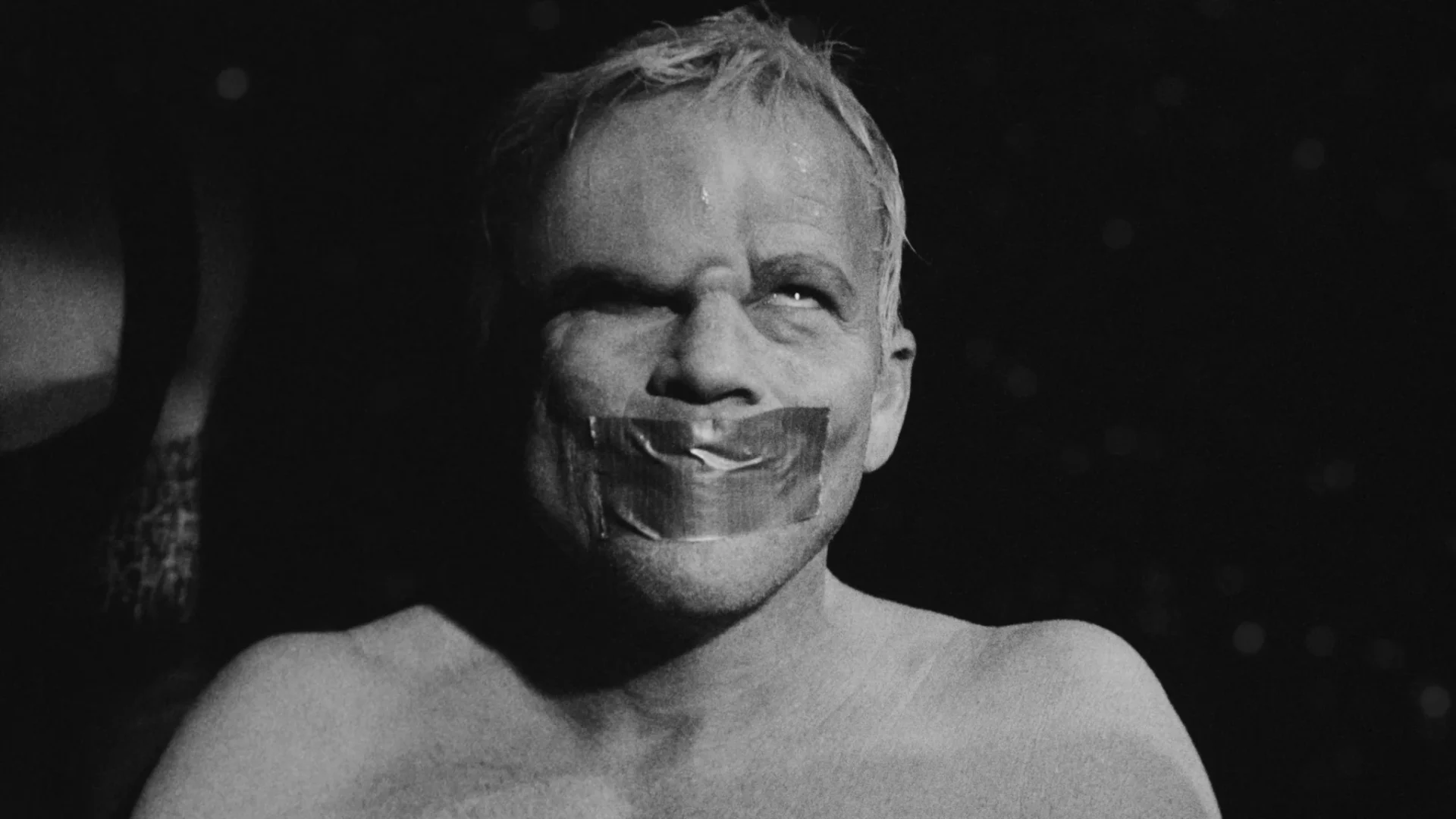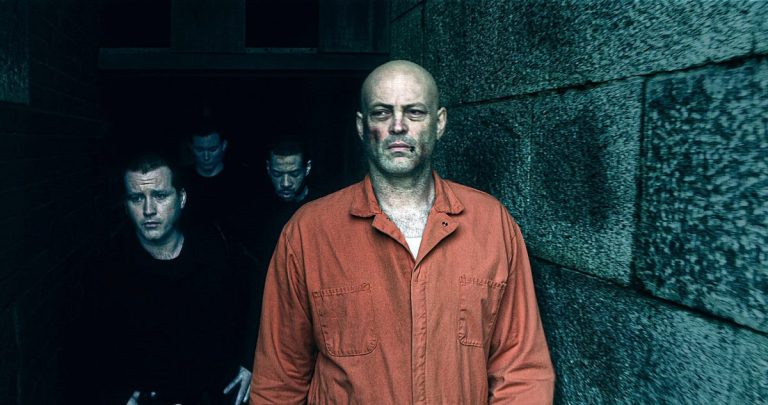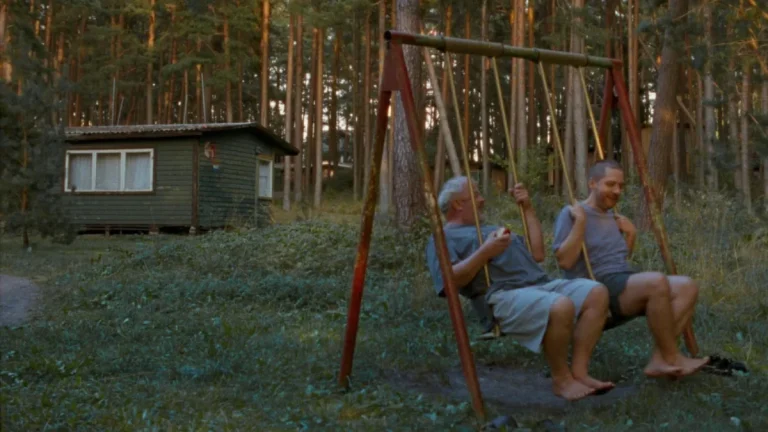Science fiction dramas are tricky. How does one render general, wider anxieties about the crumbling state of the world in a manner that’s fresh, disorienting, and disturbingly alluring? A barrage of films has attempted to wade into the intense despair of our times, particularly our futures, with plausible emotional outcomes and a heightened degree of stylization. The latter is viewed as especially necessary for reflecting a world as fractured and hurtling as ours. So, the primed production design is amped up as fragmented and stylish.
The dissolution of the world, the uncontrollable hubris of men, and the quest for higher knowledge coalesce terrifyingly in Eddie Alcazar’s “Divinity.” What happens when men push at the framework of the ordinary reach of sanity and powers to fashion something that’s untested and promises a colossal range of abilities that can vanquish mere, base fears of the human condition? Is transcendence possible through scientific/technological extreme advancement? What is the price of this pursuit of transcendence? Does one end up losing something more essential and internal in the process? How does this transaction play out?
Divinity (2024) Plot Summary & Movie Synopsis:
Can Humanity Escape Its Destructive Nature?
The film evokes the punctuated, splintering consciousness of humanity that has made compulsive efforts at far-reaching ambition. One might see the devastating consequences of their actions in the moment of the deed or when they kick-start into motion that heady dream of absolute power. But sooner or later, the repercussions do catch up with man in ways that beggar belief, and yet they couldn’t have been more of a knee-jerk response to heedless ambition at conquering limitations set forth in stone. Can one turn against primal dictates and execute a new order?
“Divinity” extravagantly hints that it’s not possible without massive, major losses. Even if one fathoms the annihilating effect of their high-vaulting efforts, greed is so powerful and all-consuming that everything else stands to be swept away and erased in that drive to seek unchallengeable mastery. It is a deeply dehumanizing quest, one that slowly but steadily chips away at everything one can hope the human condition to be.
Is Eternal Life Worth the Ultimate Sacrifice?
The film plunges us into the soul-negating shadow that billionaires and tech tycoons cast in their relentless, thoughtless strides toward a taste of domination and pure control. Who cares if others are expunged in the process? It is a selfish process anchored in a crazed belief in one’s entitlement. It is amazing the extent to which humans can go to get what they so desperately seek. Sterling Pierce ( Scott Bakula) is a scientist who formulates an anti-aging drug. It promises immortality that ever-desired thing embossing humanity’s urges for ages. However, there is a caveat. The drug isn’t effective in warding off mental disarray and disrepair. Sterling is hopeful of fixing it, but he dies.
When the film opens, it is his son, Jaxxon ( Stephen Dorff), who has wholly taken over the operations of redesigning and perfecting the drug. But he has other agendas, unremittingly nefarious as abetted by his zealous bouts. Jaxxon has pushed the chemical drug into commercial marketplace consumption. So the world which the film depicts is overrun by hunky bodybuilders and impossibly svelte women. However, fertility has been compromised. It’s become the inveterate price of availing the drug.

Jaxxon’s Isolated World: A Reflection of Humanity’s Future?
Jaxxon lives in a cordoned-off desert compound in the middle of nowhere. He has no links to human habitation except women who come in to service his sexual needs. In the midst of such a service, two alien vagabonds break into the premises. Moises Arias and Jason Genea play these burglars. We don’t exactly know where they have come from. In fact, the film doesn’t bother itself with the nitty-gritty of geography, choosing to shuttle between dislocated spatial chunks in a consistent stylized monochrome.
It is terribly convenient for the film’s design and equally specious as a proposition because it critically gets in the way of any sustained emotional association or involvement in the narrative unfurling. You struggle to piece the fragments into an emotional whole because they are all so scattered and almost scatterbrained in composition.
Can Anarchy Be the Solution to a Dystopian World?
The burglars turn out to be brothers. They seek a sort of anarchy, an overthrow of the operations at the compound that Jaxxon presides over. But firstly, they tie Jaxxon up and decide to administer him a dose of the drug. He is resistant but powerless in the face of the brothers’ coercion. They inject him with a pure concentrate. He gets all worked up, demanding he be freed at once since the drug should only be delivered and used in diluted form.
Another bizarre subplot develops in tandem, involving the burglars and a mysterious woman, a hired sex worker named Nikita. This track entailed jealousy between the brothers. Another plot track revolves around a coven of women led by Bella Thorne’s Ziva, who plans to repopulate the world without the drug.
The film quickly reveals itself as having a hyper-expressionist patina. Plot coherence isn’t the topmost priority; rather, there’s an inchoateness to the design. Images crash and bleed into each other in a strange sort of fugue.
Divinity (2024) Movie Ending Explained:
What happens to the anti-aging drug?
Jaxxon’s brother, Rip ( Mike O’Hearn), swoops in to rescue him. But it is much too late. Jaxxon has already quickly started transmogrifying into a hideous, grotesque, hyper-pumped-up beast-like being, completely lacking in human attributes. The climax is flooded with a lot of action. The brothers spar with Rip, ultimately killing him. However, it does take a deadly toll on them as well. Finally, the one who remains alive but badly wounded clashes with Jaxxon himself. The climax is bloody drawn-out, frequently bordering on the ridiculous.
It ends with Jaxxon getting annihilated and disappearing into flecks of ash. But there’s a tinge of hope as it hints fertility has a return, with Nikita giving birth under the coven’s close watch and breaking the cycle. With Jaxxon’s annihilation, the drug’s probable further manipulation lies butchered, albeit we don’t know how the marketplace would continue to respond to the usage of the drug. However, one can surmise that the female coven might gain an added hand in determining the future.




![The Occupant [2020] Netflix Review – A convoluted yet sinister thriller about greed and perfection](https://79468c92.delivery.rocketcdn.me/wp-content/uploads/2020/05/The-Occupant-Hogar-Highonfilms-768x321.jpg)



